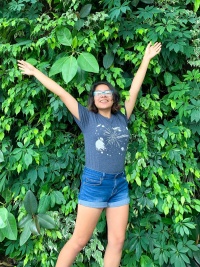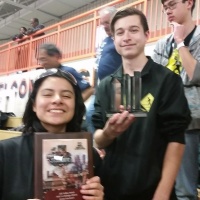Ponette Rubio
“What’s in a name? That which we call a rose
By any other name would smell as sweet...” [1]
Except that by any other more common name,
My online identity would be quite different.
My name is Ponette and I am the first and only Ponette at the University of Michigan as of 2021. So much so that my unique name is my first name, ponette.
Due to the unique nature of my name, a search for “Ponette Rubio” leaves very little room for confusion about whether or not the Ponette in question is indeed me. In middle school I tried to find another Ponette and wound up finding uncomfortable amounts of information about myself online. Since then, I have been quite intentional about making sure that I keep my life as private as possible without becoming a digital pariah. I keep my social media private and I am careful about what I post.
Despite guarding my information, a simple search of my name on any search engine still yields significant amounts of information about myself. My age, previous and current addresses, school and work locations are all readily available. I cannot control who sees this information. The more I begin to understand the internet, I realize that my name has marked me with a bright yellow flag. I will never have the anonymity that others with a more common name have. Even the absence of information about me stands out in ways it does not for people with more common names.
Contents
Is my life an open book?
Search Query: Incognito
I started out by looking myself up by first and last name on Chrome Incognito mode with a vpn. The goal was to mimic the search results from a stranger with no connection to me. I came across several articles from the website that my workplace runs [1]. As I scrolled further, I found my social media handles though when I clicked on my handle no post content came up as my profiles are private. I also found several articles from my high school’s digital newspaper describing my roles at robotics competitions [2]. I then clicked on the pictures tab. Almost all the pictures that came up were taken from articles and websites I mentioned above. Since my name was directly mentioned in many of the linked articles, one would struggle to not identify me. I was also disappointed to see my social media profile pictures pop up on image searches despite having set all my social media accounts to private. For example, a grainy version of my profile picture that I use on several accounts shows up as one of the first images during an incognito search [3].Search Query: Regular Search
My search results on the Chrome browser on regular mode yielded identical results to my incognito search results. This made me more aware that my information is equally available regardless of whether the Chrome browser is directly linked to my umich Gmail account or if the Chrome browser is in incognito mode with a vpn. This concerned me because my online presence began to grow substantially starting from freshman year in high school. Especially during my first two years of high school, I did not have the understanding of my digital footprint required to make truly informed decisions about my data identity.
Holes or Clues?
While I knew I had been relatively successful at keeping key information about my life hidden from my online identity, I began to realize that the act of not putting my most personal information online was itself a message to the online community. For example, I tend to use my social media as a way to broadcast my happy moments. When illness in the family brought on a period of hardship, I stopped posting because I did not feel like sharing my information. However people reached out to me because by not sending out information about myself, I was still sending out a message. Perhaps this will not be something that a stranger could draw concrete conclusions from, but I still think about this paradox.
Who gets to create online the Ponette?
How much of my digital imprint serves the interests of others?
Through this journey of rediscovering my online identity, I began to notice that most of the results were reflective of what my school, my work, my clubs had decided to share about me. Very little outside of my LinkedIn was really intentional information put out by me. In fact, once I give permission to an organization to use my information - I have very little agency over how that information is used. This is concerning when the vast majority of the information available about me online ties directly to these organizations.
Naming babies in the digital age
After reading several articles about myself, scrolling through pictures of me from high school to college and tracing the ways in which my information has created my online identity, I now understand in even greater depth the degree to which my information will always stand out.
My parents had me in the year 1999. During this time personal computers were still new and the vast internet we have today was still in its infancy. I do not believe that they meant ill when they named me however, their decision has and will to continue to leave a permanent mark on me. In the digital age, perhaps parents should seek out more guidance as they choose a name for their child as that name will define their online identity in vast and permanent ways.
References
Google. “Google.” Google.com, 2019, www.google.com/.,
Shakespeare- ↑ Rocklin, Edward L. Romeo and Juliet. New York, Palgrave Macmillan, 2010.


